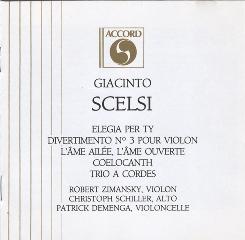Giacinto Scelsi - Chamber Music for Strings (Duo, Soli, Trio À Cordes) [1989]
Giacinto Scelsi - Chamber Music for Strings (Duo, Soli, Trio À Cordes) [1989]

01 Elegia per Ty, for viola & cello (1958) - 1 02 Elegia per Ty, for viola & cello (1958) - 2 03 Elegia per Ty, for viola & cello (1958) - 3 04 Divertimento for violin, No 3 (1955) - 1 05 Divertimento for violin, No 3 (1955) - 2 06 Divertimento for violin, No 3 (1955) - 3 07 Divertimento for violin, No 3 (1955) - 4 08 L'âme ailée for violin (1973) 09 L'âme ouverte for violin (1973) 10 Coelocanth, for viola (1955) - 1 11 Coelocanth, for viola (1955) - 2 12 Coelocanth, for viola (1955) - 3 13 Trio for strings (1958) - 1 14 Trio for strings (1958) - 2 15 Trio for strings (1958) - 3 16 Trio for strings (1958) – 4 Patrick Demenga – cello Robert Zimansky – violin Christoph Schiller – viola
The second half of the 20th Century is unthinkable without Giacinto Scelsi. A composer who was many years ahead of his time, Scelsi did not receive widespread recognition until the late 1980’s when the ISCM Festival in Cologne presented his works to endless acclaim, though he had been composing prolifically since the 1930s. Scelsi’s contribution to music of the 20th Century is comparable to that of Cage, Xenakis and Rudhyar, but his importance as a mystical visionary, or “messenger between two worlds” can only be compared to the likes of fellow modern Pythagoreans R. Buckminster Fuller, G. I. Gurdjieff, Timothy Leary, Nikola Tesla, William Burroughs, Wilhelm Reich, William Butler Yeats, and Arthur Machen.
Scelsi was an intensely private person whose life was shrouded in mystery. Although he apparently dictated an autobiography on tape, it is as of now unavailable. The few facts known about him are primarily from interviews with people that he worked with, and the threads of this scant data reveal a fascinating person of immense spiritual power and charm, a modern-day shaman who achieved illumination after years of yogic meditation and a consciousness altering near-death illness. Scelsi applied his “supramental” talents towards the task of transmediating a vast body of etheric knowledge from a higher plane into a “growling, sliding, writhing, meditative, formless, melodyless, harmonyless music” and was able to create something “unlike anything else in European history.” --- marcjwolf.com
download: uploaded filecloudio solidfiles anonfiles yandex 4shared mediafire mega nornar








